
Fluxbox is a stacking window manager for the X Window System, which started as a fork of Blackbox 0.61.1 in 2001, with the same aim to be lightweight. Its user interface has only a taskbar, a pop-up menu accessible by right-clicking on the desktop, and minimal support for graphical icons. All basic configurations are controlled by text files, including the construction of menus and the mapping of key-bindings. Fluxbox has high compliance to the Extended Window Manager Hints specification.

Openbox is a free, stacking window manager for the X Window System, licensed under the GNU General Public License. Originally derived from Blackbox 0.65.0, Openbox has been completely re-written in the C programming language and since version 3.0 is no longer based upon any code from Blackbox. Since at least 2010, it has been considered feature complete, bug free and a completed project. Occasional maintenance is done to keep it working, but only if needed.

Arch Linux is an independently developed, x86-64 general-purpose Linux distribution that strives to provide the latest stable versions of most software by following a rolling-release model. The default installation is a minimal base system, configured by the user to only add what is purposely required.

PCLinuxOS, often shortened to PCLOS, is a rolling release Linux distribution for x86-64 computers, with KDE Plasma, MATE, and XFCE as its default user interfaces. It is a primarily FOSS operating system for personal computers aimed at ease of use.
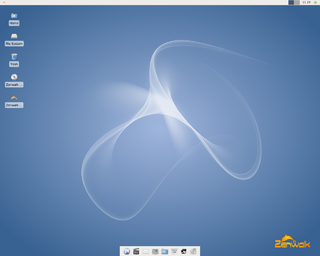
Zenwalk GNU/Linux is a desktop-focused Linux distribution founded by Jean-Philippe Guillemin. It is based on Slackware with very few modifications at system level making it 100% compatible with Slackware. It aims to be a modern, multi-purpose Linux distribution by focusing on internet applications, multimedia and programming tools. It comes with many specialized tools and is designed for beginner through advanced users, as it offers system configuration via both graphical tools and the command line.

Pardus is a Linux distribution developed with support from the government of Turkey. Pardus' main focus is office-related work including use in Turkish government agencies. Despite that, Pardus ships in several languages. Its ease of use and availability free of charge has spawned numerous communities throughout the world.

LXDE is a free desktop environment with comparatively low resource requirements. This makes it especially suitable for use on older or resource-constrained personal computers such as netbooks or system on a chip computers.

CrunchBang Linux was a Linux distribution derived from Debian by Philip Newborough.

Nova is a Cuban state-sponsored Linux distribution launched in February 2009. It was developed in Havana at the University of Information Science (UCI) by students and professors to provide free and open-source software (FOSS) to inexperienced users and Cuban institutions. While the initial version was Gentoo-based, the developers switched to Ubuntu beginning with Version 2.1.

Manjaro is a free and open-source Linux distribution based on the Arch Linux operating system that has a focus on user-friendliness and accessibility. It uses a rolling release update model and Pacman as its package manager. It is developed mainly in Austria, France and Germany.

Antergos is a discontinued Linux distribution based on Arch Linux. By default, it includes the GNOME desktop environment, but it also offers options for Cinnamon, MATE, KDE Plasma 5, Deepin, and Xfce desktops. Originally released in July 2012 as Cinnarch, it quickly gained popularity and was ranked among the top 40 most popular distributions on DistroWatch by June 2013. The name Antergos derived from the Galician word for ancestors, was chosen to "to link the past with the present".
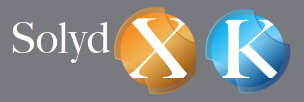
SolydXK is a Dutch Linux distribution based on Debian. It aims to be simple to use, providing an environment that is stable, secure, and ideal for small businesses, non-profit organizations and home users.
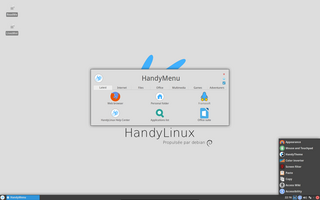
HandyLinux is a simplified Linux operating system developed in France, derived from the Debian stable branch. It was designed to be easily accessible and downloadable, so that it could be used by people with very little computer experience and on a range of older hardware that was no longer supported by the latest versions of proprietary operating systems. It was particularly aimed at older people with dated hardware who do not need nor possess the skill to use many features afforded by state-of-the-art operating systems.
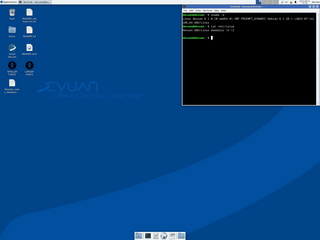
Devuan is a fork of the Debian Linux distribution that uses sysvinit, runit or OpenRC instead of systemd. Devuan aims to avoid "lock-in" by projects like systemd and aims to maintain compatibility with other init systems to avoid detaching Linux from other Unix systems.

Parrot OS is a Linux distribution based on Debian with a focus on security, privacy, and development.
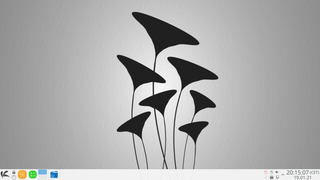
KaOS is a desktop Linux distribution that features the latest version of the KDE desktop environment, the LibreOffice office suite, and other popular software applications that use the Qt toolkit.

Artix Linux is a rolling-release distribution based on Arch Linux that uses inits such as OpenRC, runit, s6, or Dinit, as opposed to Arch Linux's init systemd.

EndeavourOS is a Linux distribution based on Arch Linux. EndeavourOS uses a rolling release schedule. As of 20 November 2023, the most recent release is 11-2023 ("Galileo").
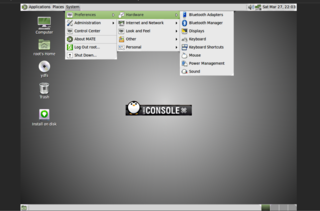
LinuxConsole is a Linux-based operating system independently developed by Yann Le Doaré. The distro is built from scratch by developers from France, and has support for multiple languages. It is not based on any other Linux distribution and primarily focuses on being lightweight and easily accessible. LinuxConsole can function as a live CD or live USB. It can also be installed as a complete operating system. LinuxConsole should be written as one word. The "console" part of the word isn't related to Linux system console mode, but instead represents the ease of using a game console.




















